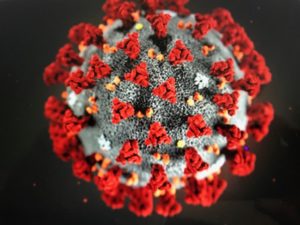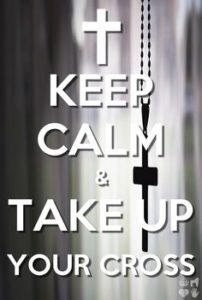 Imagine that you, a loved one, or a friend were stricken with the COVID-19 virus. Then, imagine a politician asserting that it would be the lesser of two evils to suspend the social practices now curbing the spread of COVID-19 and saving lives than to maintain such practices and further threaten the economy. That is: the greater evil would be to damage the economy further than to allow the virus to spread and suffer the consequences—which might be the death of your loved one, your friend or you.
Imagine that you, a loved one, or a friend were stricken with the COVID-19 virus. Then, imagine a politician asserting that it would be the lesser of two evils to suspend the social practices now curbing the spread of COVID-19 and saving lives than to maintain such practices and further threaten the economy. That is: the greater evil would be to damage the economy further than to allow the virus to spread and suffer the consequences—which might be the death of your loved one, your friend or you.
Rep. Trey Hollingsworth asserted as much in a radio interview on WIBC.** He noted  that continuing social distancing and stay-at-home measures are required to stop the virus’ spread and more deaths in its wake. At the same time, however, he stressed that the economy is also suffering a disaster which poses a threat to “our way of life as Americans.” Rep. Hollingsworth urged, “We have to get Americans back to work, back to their schools, and back to their churches.” And, furthermore, “That’s the strength of this country. We have to understand that.”
that continuing social distancing and stay-at-home measures are required to stop the virus’ spread and more deaths in its wake. At the same time, however, he stressed that the economy is also suffering a disaster which poses a threat to “our way of life as Americans.” Rep. Hollingsworth urged, “We have to get Americans back to work, back to their schools, and back to their churches.” And, furthermore, “That’s the strength of this country. We have to understand that.”
Therefore, he reasons, we face two extreme alternatives: the likely destruction of the economy or the continued dying of some of the most vulnerable among us. As responsible leaders, we must choose the lesser of the evils: return to the pre-COVID-19 way of life, curbing further economic trauma and pain, even though this will mean death for some people. Or, to put it the other way around, we must choose the greater good: saving the economy rather than saving the lives of people who will fall prey to COVID-19.
Later that same day, Rep. Hollingsworth’s office issued a follow-up statement that acknowledged: “It’s hyperbolic to say that the only choices before us are the two corner solutions: no economy or widespread casualties.” Yes, indeed!
Now, I do not want to pile-on, here. (At least, not too much!) Rep. Hollingsworth, both in person and on his website, has generated no little response. Many have pointed out the unnecessary reduction of options to either saving the economy or saving people; the questionable assertion that “our way of life as Americans” can be mirrored adequately by the leading economic indicators; and the accuracy, not to mention morality, of suggesting that the strength of this country is its citizens’ willingness to choose the death of vulnerable others in order to protect their own personal well-being. On the latter, the storied and perhaps somewhat mythical moral narrative of the U.S.A. is exactly the opposite: that Americans sacrifice themselves so that the vulnerable and threatened are protected and preserved.
I do want to face the current crisis in ways that reflect deep devotion to the One who loves us and gave himself for us, and rose up from the grave, to remove all the impediments (internal and external) to our living as part of His new creation, no longer for self but for Him and His cause (as in 2 Cor. 5:14-21). In that connection, consider the following confessions and resolves.
I am surprised and disappointed to find how drawn I am to the prospect of just “getting back to normal,” whatever that is. Even for a more reflective and introverted person, such as I, the isolation is ENOUGH already! But it’s not really the isolation, it’s the “forced” isolation and the inability to do as I please that most irks me. If I could do whatever I wanted, then I could choose to stay in out of regard for others, or not. I am disappointed at the degree to which “self” presides in such moments!
But it gets worse.
I am confident that most people would choose to help vulnerable folk, especially when under lethal threat. In fact, many would be willing to give of themselves, even sacrifice, to do so. And, even more so if the vulnerable were our/my own. But all of this remains an abstraction, a hypothetical. Until it isn’t. So, am I willing to suffer loss so that the vulnerable are protected and spared? Am I willing to have the tables turned, so that I must adjust and make do, so that others have chances I once considered my right? After three months of little sacrifices have accumulated into what is beginning to feel like a lot, am I still willing? I am disappointed to note how my fervor dissipates over time.
But it gets worse.
I am also confident that there are limits—limits to what we may reasonably expect. At some point, not going back to work appears no longer viable. Right? The government cannot print money endlessly, even if by miracle the partisans in whose hands such decisions rest could rise above their special interests. (Snarky, I know!) At some point, businesses will go-out-of-business if something doesn’t happen. At some point, the nest egg, assuming you have one, will be exhausted. At some point, most all of us will join the ranks of the “under-privileged.” If something doesn’t happen to change things … If the people in power don’t do something … I am disappointed that, though my mind and spirit seldom track this way, I see and feel the draw of this “logic of the inevitable.”
And then it can get way worse.
Because when what appears and feels inevitable starts to happen, or even appears to happen, then all that I profess in calmer, less-threatening moments is put to the test. When I fear it’s come down to the needs of others and my own, to life and death for me and mine, as well as for others, when scarcity—real or perceived—falls upon us, will the otherwise unthinkable then appear reasonable? Would we see the “logic” of calculating the value of life for some relative to others? Would we conclude it is better for a few to die so that the many may be saved? Would we be surprised to find the ground underneath our feet suddenly shifting for lack of foundation?
Here are some resolves.
While I will point out the flaws and draconian possibilities within Rep. Hollingsworth’s initial statements, I cannot cast any stones. I see how he and others reason their way to places where his statements can seem right, even no-brainers. I will not cast stones, (though I will likely have difficulty casting a ballot)! I see how they get there, and I can imagine how I could go-along for the ride.
So, I resolve to double down on following the one who calls us to:
- Deny self—resisting a focus upon me and my rights, which makes me irked and frustrated at current restrictions, and may lead to far worse, but always diverts primary attention from God and others;
- Take up a cross—embracing the need to join Jesus in sacrifice, not for sins (that has been done!) but to contribute to establishing Jesus’ way of life as the norm for as many as possible; and then
- Follow Jesus—trusting that more is going on, more is in the works, than I now know, and that as innocuous and simple as this seems, precisely this will change the world.
Trusting that Jesus is the wisest, most resourceful and most powerful Person who has come to be “with-us” in our Pandemic setting is the only way forward for people who claim him as Messiah and Lord. This is to trust that:
- Jesus is with all of us who shelter safely;
- Jesus is with those who are stricken with the virus—most of all through the service, care, touching and supporting of medical front line personnel;
- Jesus is with those whose front-line service has depleted them, or infected them, and now threatens them—not least through our love and prayers for them, as well as our practical deeds in their support;
- Jesus is with those who seek to figure out how the virus works in order to neutralize its threat—helping them to see, understand, and draw conclusions that are valid and will be life-saving—for, after all, it was through Jesus that all things were made as they are, and now hold together as they do;
- Jesus is with those in regional, national, and global positions of authority to guide the use of power and deployment of resources to arrest the spread, to treat the stricken, and to lead the world and its various regions to a post-pandemic condition that will be wiser, safer and closer to God’s design; and
- Jesus’ presence and power will manifest in such ways, strangely yet truly, not least and maybe primarily, through the vigilant, obedient, and persevering prayers of His people.
Thus, again, imagine that you, a loved one, or a friend were stricken with the COVID-19 virus. I know, many of us do not have to imagine it! In an environment of political and social confusion and wrangling, bringing us to extreme alternatives, from where would help come? Of course, from multiple directions! Yet behind them all will be millions of Jesus’ friends. As they/we double down on the basics of following Jesus, God’s help has and will arrive and be at work in millions of ways.
**For a report from the News Station, see: https://www.wibc.com/news/trey-hollingsworth-we-have-to-get-americans-back-to-work/